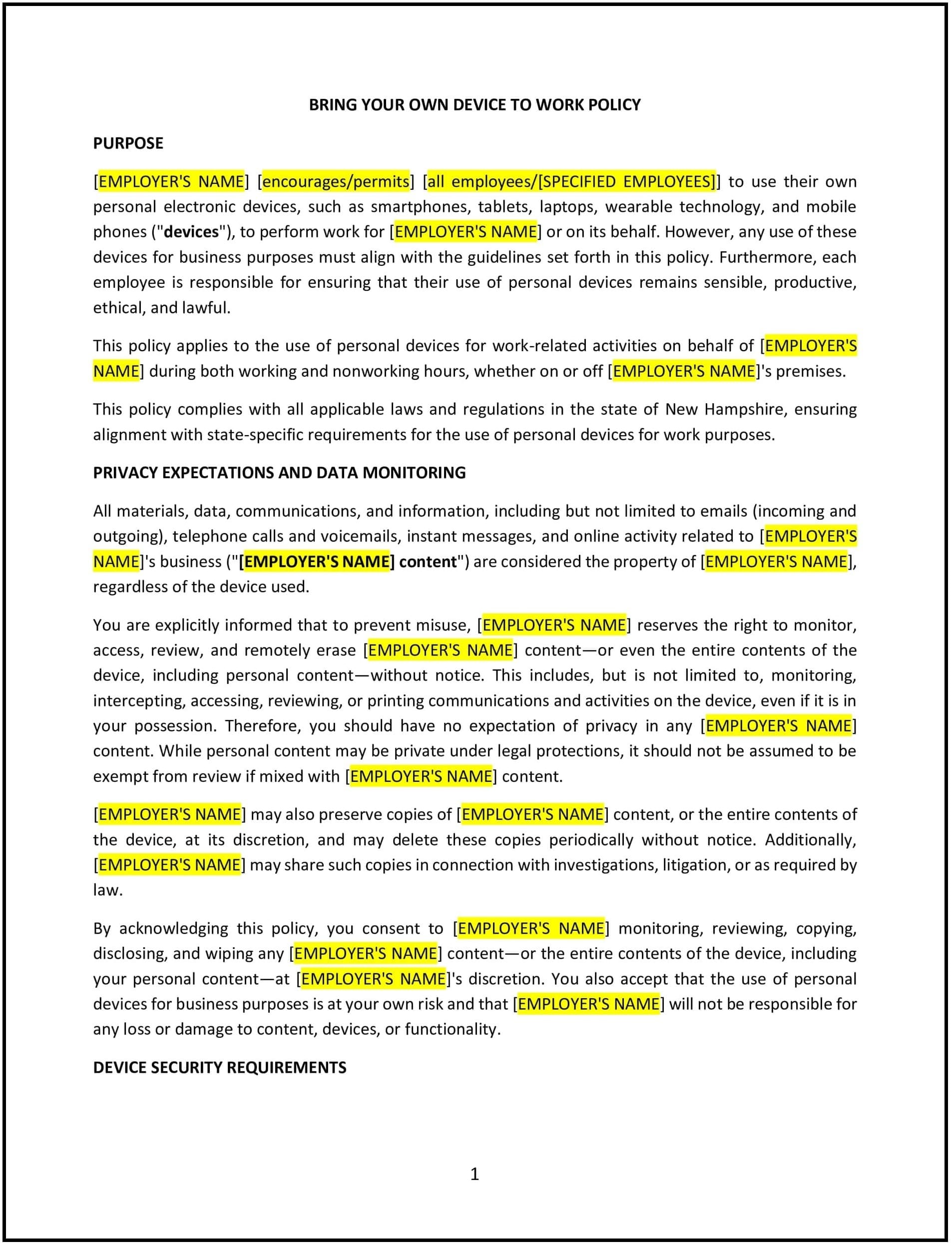Bring your own device to work policy (New Hampshire): Free template
Got contracts to review? While you're here for policies, let Cobrief make contract review effortless—start your free review now.

Customize this template for free
Bring your own device to work policy (New Hampshire)
A bring your own device (BYOD) policy helps New Hampshire businesses manage the use of personal devices, such as smartphones, laptops, and tablets, for work purposes. This policy outlines the guidelines for employees using their personal devices in the workplace, including security measures, acceptable use, and the company’s responsibilities.
By adopting this policy, businesses in New Hampshire can balance flexibility and productivity while maintaining security and protecting sensitive information.
How to use this bring your own device to work policy (New Hampshire)
- Define acceptable devices: Specify which types of devices are allowed for work use, including smartphones, tablets, laptops, and other personal electronics.
- Set security requirements: Establish security protocols for personal devices, such as requiring password protection, data encryption, and the installation of company-approved software or security apps to protect sensitive information.
- Define acceptable use: Outline the appropriate use of personal devices at work, including the types of work-related activities that employees are permitted to perform, such as accessing company email, documents, or communication platforms.
- Address data privacy: Clarify the company’s responsibilities and the employee’s responsibilities regarding data security, ensuring that personal and company data are kept separate and confidential.
- Implement device monitoring: Specify whether the company will monitor personal devices for security purposes, such as tracking device activity, remotely wiping data, or accessing company applications installed on the devices.
- Outline reimbursement policies: Determine if the company will reimburse employees for the use of personal devices for work-related purposes, such as for phone bills, internet data charges, or device repairs.
- Provide guidelines for device removal: Address the procedure for removing company data from personal devices when the employee leaves the company or no longer uses the device for work purposes.
- Review and update: Regularly review the policy to ensure it reflects New Hampshire regulations and the company’s changing needs.
Benefits of using this bring your own device to work policy (New Hampshire)
This policy provides several benefits for New Hampshire businesses:
- Promotes flexibility: Allows employees to use their own devices, offering greater flexibility in how they perform their work and reducing the need for the company to provide additional equipment.
- Reduces company costs: By allowing employees to use their personal devices, businesses can save on the costs of purchasing and maintaining company-issued devices.
- Increases productivity: Employees may be more familiar and comfortable with their own devices, which can lead to higher efficiency and productivity in completing work tasks.
- Protects company data: Ensures that security measures are in place to protect company data and prevent unauthorized access or breaches through personal devices.
- Improves employee satisfaction: Offers employees the ability to use their preferred devices while working, contributing to greater satisfaction and morale.
Tips for using this bring your own device to work policy (New Hampshire)
- Communicate the policy clearly: Make sure all employees are aware of the BYOD policy and understand the rules regarding security, acceptable use, and responsibilities for protecting company data.
- Implement security measures: Ensure that all personal devices meet the necessary security standards, including password protection, encryption, and the installation of anti-virus or security software.
- Provide technical support: Offer guidance and support for employees who may need help setting up security features or managing their devices in accordance with company requirements.
- Monitor compliance: Regularly check that employees are following the BYOD policy, including adhering to security protocols and using their devices appropriately for work purposes.
- Review the policy regularly: Update the policy as needed to reflect changes in technology, security risks, or New Hampshire state laws related to data privacy and employee rights.